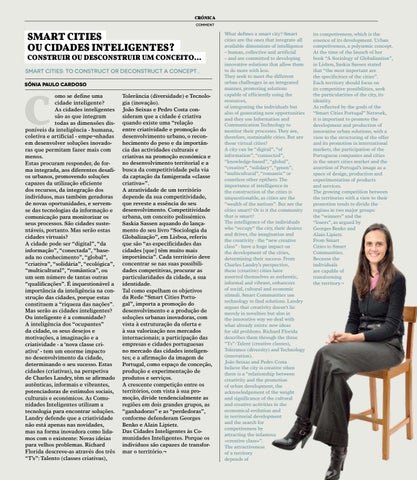CRÓNICA COMMENT
SMART CITIES OU CIDADES INTELIGENTES?
CONSTRUIR OU DESCONSTRUIR UM CONCEITO… smart cities: To construct or deconstruct a concept... Sónia Paulo Cardoso
C
omo se define uma cidade inteligente? As cidades inteligentes são as que integram todas as dimensões disponíveis da inteligência - humana, coletiva e artificial - empe¬nhadas em desenvolver soluções inovadoras que permitam fazer mais com menos. Estas procuram responder, de forma integrada, aos diferentes desafios urbanos, promovendo soluções capazes da utilização eficiente dos recursos, da integração dos indivíduos, mas também geradoras de novas oportunidades, e servemse das tecnologias da informação e comunicação para monitorizar os seus processos. São cidades sustentáveis, portanto. Mas serão estas cidades virtuais? A cidade pode ser “digital”, “da informação”, “conectada”, “baseada no conhecimento”, “global”, “criativa”, “solidária”, “ecológica”, “multicultural”, “romântica”, ou um sem número de tantas outras “qualificações”. É inquestionável a importância da inteligência na construção das cidades, porque estas constituem a “riqueza das nações”. Mas serão as cidades inteligentes? Ou inteligente é a comunidade? A inteligência dos “ocupantes” da cidade, os seus desejos e motivações, a imaginação e a criatividade - a ‘nova classe criativa’ - tem um enorme impacto no desenvolvimento da cidade, determinando o seu sucesso. Estas cidades (criativas), na perspetiva de Charles Landry, têm‐se afirmado autênticas, informais e vibrantes, potenciadoras de estímulos sociais, culturais e económicos. As Comunidades Inteligentes utilizam a tecnologia para encontrar soluções. Landry defende que a criatividade não está apenas nas novidades, mas na forma inovadora como lidamos com o existente: Novas ideias para velhos problemas. Richard Florida descreve-as através dos três “T’s”: Talento (classes criativas),
Tolerância (diversidade) e Tecnologia (inovação). João Seixas e Pedro Costa consideram que a cidade é criativa quando existe uma “relação entre criatividade e promoção do desenvolvimento urbano, o reconhecimento do peso e da importância das actividades culturais e criativas na promoção económica e no desenvolvimento territorial e a busca da competitividade pela via da captação da famigerada «classe criativa»”. A atratividade de um território depende da sua competitividade, que reveste a essência do seu desenvolvimento. Competitividade urbana, um conceito polissémico. Saskia Sassen aquando do lançamento do seu livro “Sociologia da Globalização”, em Lisboa, referiu que são “as especificidades das cidades [que] têm muito mais importância”. Cada território deve concentrar‐se nas suas possibilidades competitivas, procurar as particularidades da cidade, a sua identidade. Tal como espelham os objetivos da Rede “Smart Cities Portugal”, importa a promoção do desenvolvimento e a produção de soluções urbanas inovadoras, com vista à estruturação da oferta e à sua valorização nos mercados internacionais; a participação das empresas e cidades portuguesas no mercado das cidades inteligentes; e a afirmação da imagem de Portugal, como espaço de conceção, produção e experimentação de produtos e serviços. A crescente competição entre os territórios, com vista à sua promoção, divide tendencialmente as regiões em dois grandes grupos, as “ganhadoras” e as “perdedoras”, conforme defenderam Georges Benko e Alain Lipietz. Das Cidades Inteligentes às Comunidades Inteligentes. Porque os indivíduos são capazes de transformar o território.¬
What defines a smart city? Smart cities are the ones that integrate all available dimensions of intelligence – human, collective and artificial – and are committed to developing innovative solutions that allow them to do more with less. They seek to meet the different urban challenges in an integrated manner, promoting solutions capable of efficiently using the resources, of integrating the individuals but also of generating new opportunities and they use Information and Communication Technology to monitor their processes. They are, therefore, sustainable cities. But are these virtual cities? A city can be “digital”, “of information”, “connected”, “knowledge-based”, “global”, “creative”, “solidary”, “green”, “multicultural”, “romantic” or countless other epithets. The importance of intelligence in the construction of the cities is unquestionable, as cities are the “wealth of the nations”. But are the cities smart? Or is it the community that is smart? The intelligence of the individuals who “occupy” the city, their desires and drives, the imagination and the creativity - the “new creative class” - have a huge impact on the development of the cities, determining their success. From Charles Landry’s perspective, these (creative) cities have asserted themselves as authentic, informal and vibrant, enhancers of social, cultural and economic stimuli. Smart Communities use technology to find solutions. Landry argues that creativity doesn’t lie merely in novelties but also in the innovative way we deal with what already exists: new ideas for old problems. Richard Florida describes them through the three “Ts”: Talent (creative classes), Tolerance (diversity) and Technology (innovation). João Seixas and Pedro Costa believe the city is creative when there is a “relationship between creativity and the promotion of urban development, the acknowledgement of the weight and significance of the cultural and creative activities in the economical evolution and in territorial development and the search for competiveness by attracting the infamous «creative class»”. The attractiveness of a territory depends of
its competiveness, which is the essence of its development. Urban competiveness, a polysemic concept. At the time of the launch of her book “A Sociology of Globalization”, in Lisbon, Saskia Sassen stated that “the most important are the specificities of the cities”. Each territory should focus on its competitive possibilities, seek the particularities of the city, its identity. As reflected by the goals of the “Smart Cities Portugal” Network, it is important to promote the development and production of innovative urban solutions, with a view to the structuring of the offer and its promotion in international markets, the participation of the Portuguese companies and cities in the smart cities market and the assertion of Portugal’s image as a space of design, production and experimentation of products and services. The growing competition between the territories with a view to their promotion tends to divide the regions in two major groups: the “winners” and the “losers”, as argued by Georges Benko and Alain Lipietz. From Smart Cities to Smart Communities. Because the individuals are capable of transforming the territory.¬
Primavera Spring 2017 - 53
